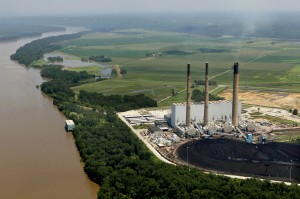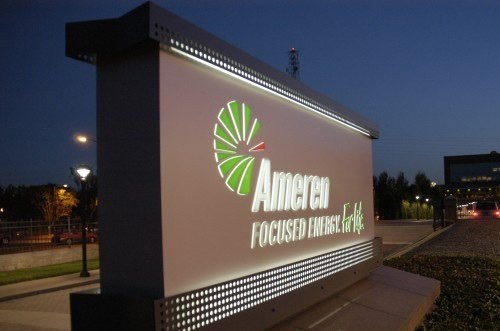
The Missouri Public Service Commission unanimously approved Ameren Missouri’s plan to build a coal ash landfill for its Labadie power plant, leaving final approval of the project in the hands of the Missouri Department of Natural Resources.
The decision Wednesday came three months after the utility regulator took days of testimony from Ameren and environmental groups who have opposed the Franklin County landfill for years. Passions have run high at the state and local levels, as Ameren sought to win regulatory approval while local residents and environmental groups fought it at every turn.
“This is an order that has kept me up at night,” Commissioner Daniel Hall said during a webcast of the Wednesday meeting. “I’m concerned about where the facility is being built. At the same time, I don’t think it’s our role to micromanage this issue.”
Opponents warn that Ameren’s plan to put the landfill in the Missouri River floodplain near its plant could pose a risk to groundwater, endangering the drinking water. A severe flood, they say, could wash coal ash into the river, contaminating a source of water for thousands in the St. Louis region. Critics cite Duke Energy’s coal ash spill earlier this year, which fouled about 70 miles of the Dan River in North Carolina, as an example of what could happen.
Ameren has said putting the landfill further away from its largest power plant would cost ratepayers millions of dollars more than storing it nearby. And the landfill would use a new design that lowers the risk of contamination, Ameren says, storing the ash as a dry, concrete-like substance rather than the wet sludge ponds used now.
The utility ultimately won over the PSC, which agreed with Ameren’s assurances that the landfill’s design — which includes a liner, a berm to withstand a 500-year flood event and a clay mixture that hardens into a mostly impermeable substance — mitigates the worst of the risk.
Although the DNR has yet to issue a construction permit, the commission referenced the department’s determination that Ameren’s proposed location is appropriate for the coal waste landfill.
The PSC faced some uncertainty over how much weight it should put on environmental and health concerns in its analysis. Ameren’s attorneys contended it should not consider those factors at all.
Hall argued that the commission, which mostly looks at economic issues and ratepayer impacts, should consider environmental factors but still leave most of that analysis to the DNR.
“I think it is of critical importance that the Public Service Commission recognize that it has a role in this process while at the same time acknowledging that the Department of Natural Resources has primary jurisdiction on environmental issues,” he said.
PSC chairman Robert Kenney more forcefully asserted the commission’s role in taking environmental concerns into account. There are past examples where the PSC has considered public health and environmental factors, he told the Post-Dispatch in an interview. He argued they fall broadly under the “public interest” the PSC considers in its decisions and looking at them is not a “radical departure” from past practice.
“Public health and environmental issues and concerns do have economic consequences,” he said at the hearing.
Kenney said he understood the concern of Franklin County residents “because they live there and drink the water,” and that their concerns should be taken seriously. However, in a concurring opinion issued along with the commission’s order, he wrote that Ameren had demonstrated the landfill is designed to mitigate those risks.
Local residents and environmental groups urged the PSC to attach several conditions to its approval, including comprehensive groundwater monitoring near its existing coal ash ponds. The PSC order said that would require the DNR’s involvement, and it does not have the authority to compel the department to do anything.
Opponents of the plan also asked the commission to prohibit any needed future cleanup costs from being charged to ratepayers, but the PSC said it couldn’t bind the decisions of future commissions.
Kenney said he would have liked to see more “definitive proof of insurance” covering coal ash spill risks. Ameren did testify it had insurance, he noted, but he wasn’t convinced it was specific to the particular risks of a coal ash landfill in a floodplain.
In his concurring opinion, he wrote that if an earthquake, flood or some other failure causes the landfill to contaminate drinking water or the river, future commissions should “closely scrutinize” any request that asks ratepayers to pay for cleanups or repairs.
“There are some things I would have liked to see, but in the spirit of compromise didn’t make it into the report and order,” Kenney said.
Warren Wood, Ameren Missouri’s vice president of external affairs and communication, said transitioning from wet coal ash storage to dry storage is the right thing to do.
“This continues to be the right solution for our customers and the responsible solution for the environment,” he said.
Andy Knott, of the Sierra Club’s Beyond Coal campaign, said the group disagreed with the PSC, but that the regulator sent a “good signal” that it can and would consider environmental and health impacts in its decisions.
The Environmental Protection Agency is expected to finalize new rules on coal ash waste later this year.
“DNR should wait until EPA issues its new rules later this year before making that decision,” Knott said.
Ameren hopes to begin construction of the landfill this summer and finish by 2016. Last week, opponents of the landfill lost their appeal at the local level, when the Franklin County Board of Zoning Adjustment decided it would not invalidate zoning on the land where Ameren plans to build the 167-acre landfill.
original source: http://www.stltoday.com/business/local/psc-approves-franklin-county-coal-ash-dump/article_73995f5e-b7bc-5f63-973b-6cd91d71b903.html



